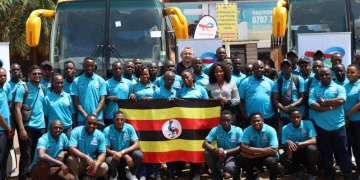
Uganda’s Health Minister, Dr. Jane Ruth Aceng, has called for additional funding to enhance cancer care and treatment in the country, emphasizing the need for regional cancer equipment to complement the existing facilities. Speaking to reporters, Aceng pointed out that Uganda’s cancer treatment infrastructure remains inadequate despite efforts to expand capacity.
“Our current cancer institute is small. We need additional funds to ensure we provide quality care and treatment for our people,” Aceng said. She underscored the urgent need to purchase more equipment to address the rising cancer burden, noting that Uganda’s neighbors—Kenya and Tanzania—are also seeking funding to strengthen their cancer treatment capabilities.
While Uganda, along with Kenya and Tanzania, launched regional cancer centers of excellence in East Africa, the progress has been hindered by the COVID-19 pandemic. Initially planned to include training facilities, the project was delayed, with only six floors of the centers completed.
Aceng explained that although cancer specialists are working tirelessly to manage the crisis, Uganda is facing a shortage of trained oncologists. “The burden of cancer is huge, yet our specialists are overwhelmed. In developed countries, it’s one doctor per patient, but here, it’s one specialist treating hundreds,” she said.
The health minister stressed that improving cancer care is not just a matter of acquiring more equipment but also requires recruiting and training more oncologists, with competitive salaries to retain these experts.
Dr. Nixon Niyonzima, Head of Research and Training at the Uganda Cancer Institute, echoed Aceng’s concerns. He highlighted that critical equipment, such as a bone marrow transplant machine, is still lacking. The machine, which costs Shs 2.5 million, is vital to the institute’s ability to provide comprehensive cancer care.
The issue of limited resources has prompted calls for urgent action. Deputy Chairperson of the National Economy Committee, Robert Ndugwa Migadde, emphasized the importance of a site visit to the Uganda Cancer Institute and Lubowa Hospital to assess the situation firsthand. “As we process the loan, it’s essential for the committee to visit these centers and understand the scope of the challenges,” Migadde said.
Many lawmakers expressed concern about the impact of inadequate cancer care on rural communities. Bukanga County North MP, Nathan Byanyima, pointed out that many cancer patients in rural areas die due to a lack of access to treatment. “People in rural areas don’t know how to cope with cancer, and the few who seek treatment often face long waiting times,” Byanyima said.
MP Peggy Joy Waako, representing Western Uganda’s elderly, noted that while some Ugandans are able to seek specialized treatment abroad, the elderly, in particular, struggle to afford such care.
The government is now seeking additional financing to fill the gaps in its cancer treatment project. State Minister of Finance, Henry Musasizi, appeared before the Parliamentary Committee on National Economy to request an additional $18.09 million from the African Development Fund for the Uganda Cancer Institute.
The financing is intended to support the East Africa Centers of Excellence for Skills and Tertiary Education in Biomedical Sciences project, which began in 2015 with a total budget of $31.5 million. The project aimed to develop the Uganda Cancer Institute as a regional center of excellence. However, due to delays caused by the COVID-19 pandemic, construction has fallen behind schedule, and escalating costs have created a significant funding gap.
Musasizi explained that the initial 24-month construction timeline was extended by over 18 months, increasing costs due to higher prices for materials and labor. As of December 2023, the African Development Fund had disbursed 88.15% of its contribution, while the Ugandan government had fully met its counterpart funding commitment.
“The delays and the rising costs have left us with a financing gap of $21.68 million,” Musasizi said. “This gap is critical and must be addressed if we are to meet our development objectives.”
As the government moves forward with the request for additional funding, lawmakers are urging swift action to ensure that cancer care in Uganda meets the growing demand for treatment, especially as the country continues to face a rising cancer burden.










Discussion about this post